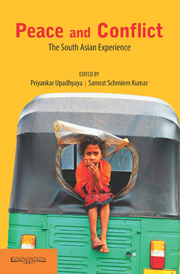Book contents
- Frontmatter
- Contents
- Foreword
- Preface
- Introduction
- 1 Conflict Resolution and Peacebuilding: Ideas, Approaches and Debates
- 2 Changing Perspectives on Peace Studies in South Asia
- 3 Peace Pedagogies in South Asia: Interreligious Understanding
- 4 Responses of Communities to Social Tension
- 5 Plurality of Peace, Non-violence and Peace Works in India
- 6 Education and Culture of Peace: Engaging with Gandhi
- 7 Structural Violence and Human Security: Gandhi's Visions
- 8 Women and the Peace Process in Nepal
- 9 Quest for Peace and Justice in Pakistan: Lawyers' Non-violent Resistance
- 10 Antinomies of Democracy and Peace in Nepal
- 11 Post-armed Conflict Trajectories in Sri Lanka
- 12 Environmental Security and Conflict in Bangladesh: Nature, Complexities and Policies
- Contributors
- Bibliography
- Index
Introduction
Published online by Cambridge University Press: 05 October 2014
- Frontmatter
- Contents
- Foreword
- Preface
- Introduction
- 1 Conflict Resolution and Peacebuilding: Ideas, Approaches and Debates
- 2 Changing Perspectives on Peace Studies in South Asia
- 3 Peace Pedagogies in South Asia: Interreligious Understanding
- 4 Responses of Communities to Social Tension
- 5 Plurality of Peace, Non-violence and Peace Works in India
- 6 Education and Culture of Peace: Engaging with Gandhi
- 7 Structural Violence and Human Security: Gandhi's Visions
- 8 Women and the Peace Process in Nepal
- 9 Quest for Peace and Justice in Pakistan: Lawyers' Non-violent Resistance
- 10 Antinomies of Democracy and Peace in Nepal
- 11 Post-armed Conflict Trajectories in Sri Lanka
- 12 Environmental Security and Conflict in Bangladesh: Nature, Complexities and Policies
- Contributors
- Bibliography
- Index
Summary
IN recent decades, peace and conflict studies have begun to take roots as a significant interdisciplinary site of teaching and research. It has proliferated globally in its various rubric ranging from peace research, peace studies, conflict resolution, conflict management and conflict transformation among others. In South Asia too, the academic programmes that teach and research on peace are rapidly gaining a foothold. Increasing number of universities and colleges in the region have set up independent departments and Centres dedicated to peace studies. It is a befitting recognition to the perennially growing template enriched by scholars and philosophers across cultures.
However, the fledgling field of peace and conflict studies is beset with a range of contestations and criticisms. There are issues about its overwhelming and often schematized research agenda, the domination of positivists and heavily quantified methodology, uncritical stance towards terminology and the disconnection between research and action. One of the lingering challenges of teaching or researching peace and conflict in South Asia has been the enduring shadow of western perspectives, which tend to relegate indigenous discourses and frameworks. In fact, most of the pedagogic approaches in the region have imitated, evolved and intersected around western perspectives often reflecting their conceptual trajectories as well as faultlines (Upadhyaya 2013). There are, of course, some notable countercurrents and alternative perspectives in South Asian scholarship, which have critiqued the western-inspired notions of peace, often with a post-colonial bent.
- Type
- Chapter
- Information
- Peace and ConflictThe South Asian Experience, pp. xi - xxPublisher: Foundation BooksPrint publication year: 2014



